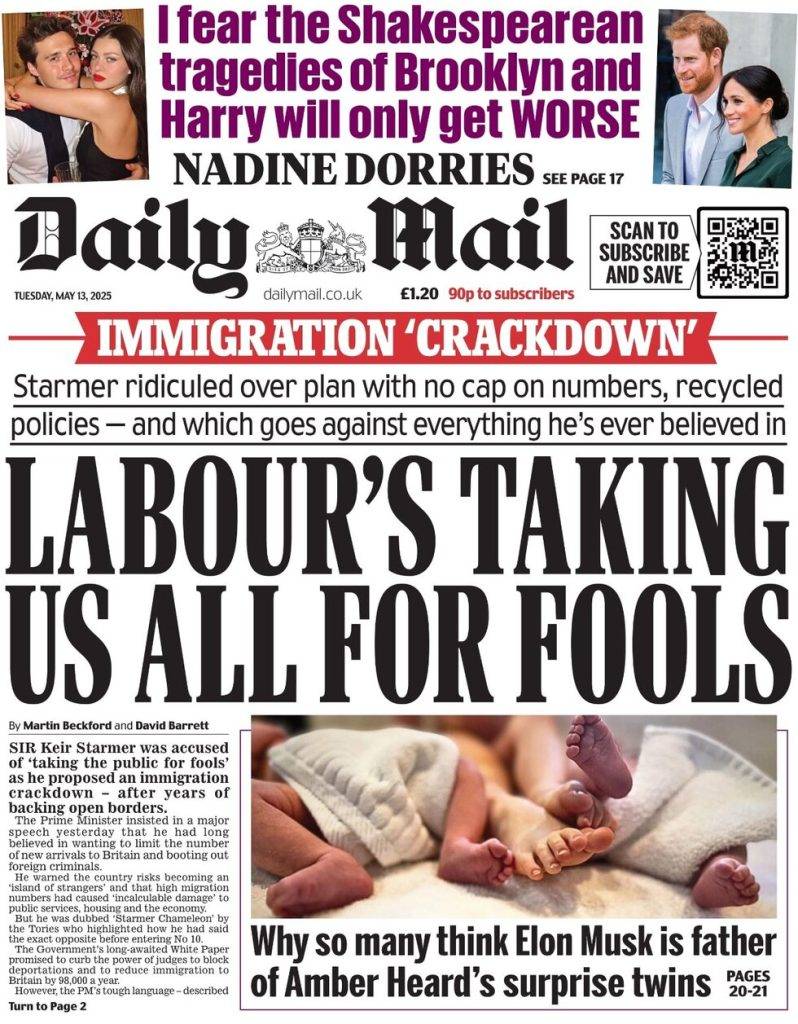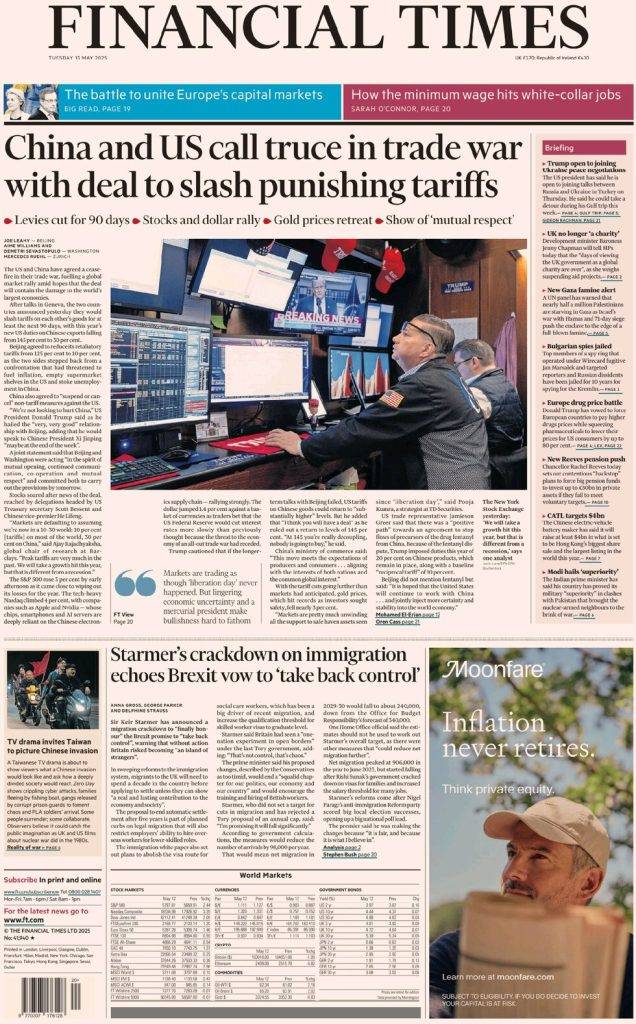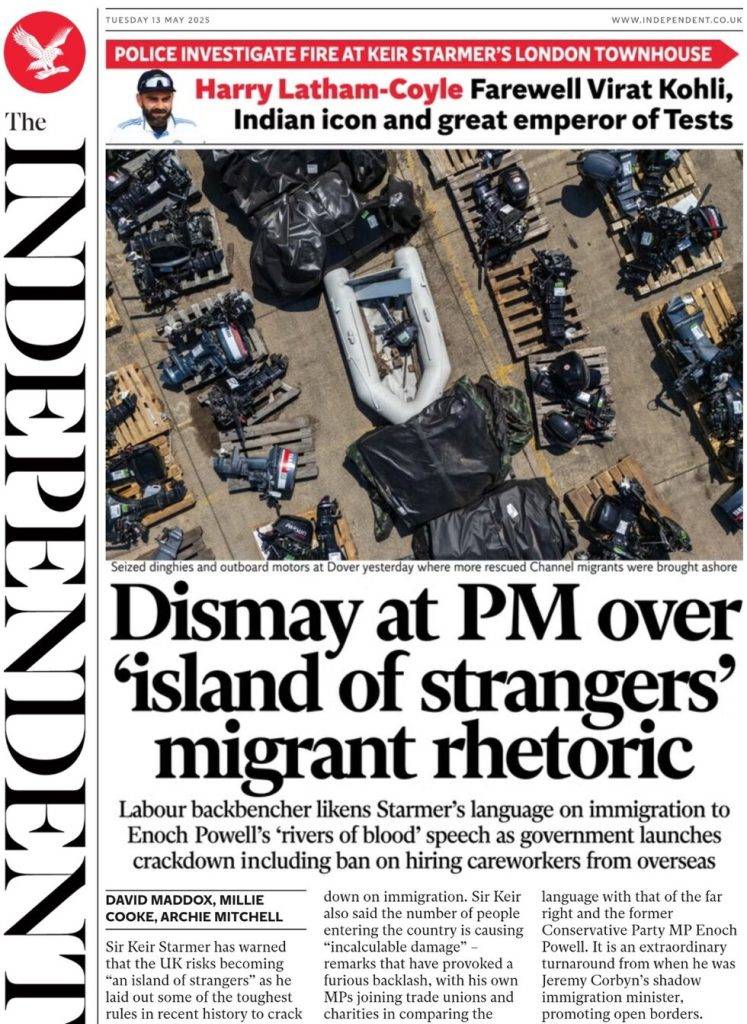- European Commissioner Dubravka Šuica to Attend US Board of Peace Meeting This Week
- Today’s Football Fixtures| PL| Seria A| La Liga & more
- Starmer Cancels Council Election Delay: What This Means for Voters
- Man Utd urged to complete £100m transfer move ahead of Arsenal
- German Finance Minister Lars Klingbeil urges swift advancement of digital euro
- Man Utd told to avoid ‘big Michael Carrick mistake’ after double manager blow
- Danish PM Mette Frederiksen reiterates Trump’s serious interest in Greenland
- Teens convicted of murdering man by luring him to beach and throwing rocks
Immigration crackdown ridiculed | Paper Talk UK
Bias Exposure
Immigration crackdown ridiculed
For a second day, there’s a lot of coverage of yesterday’s announcement from the prime minister regarding a planned crackdown on legal migration to the United Kingdom.
The papers give their assessment of the government’s plans with some condemning the prime minister’s new Nigel Farage-styled approach to immigration – an attempt to win over voters fleeing to Reform UK.
Some papers suggest the PM’s new plans don’t go far enough – saying the lack of a cap on migrants allowed in shows the prime minister isn’t serious about getting a grip on the growing migration numbers.
The Daily Mail leads with the Conservative Party’s reaction to the plans saying Tory politicians describe the prime minister as a “Starmer Chameleon” for his plans. The paper’s sub-headline highlights that the policy “goes against everything he’s ever believed in,” despite the PM’s insistence to the contrary in his speech regarding the new policy.
EXPLAINER
The headline “Immigration crackdown: Labour’s taking us all for fools“ is overtly emotive and opinion-laden, abandoning neutrality in favour of direct provocation. The accusatory phrase “taking us all for fools“ frames Labour’s actions not just as ineffective, but as deliberately deceptive, fuelling distrust and resentment.
Coupled with “immigration crackdown,” it taps into a highly charged political issue to suggest betrayal or manipulation of the public. This kind of headline prioritises outrage over analysis, using populist rhetoric to polarise readers and reduce complex policy decisions to a narrative of dishonesty and contempt.

The Guardian picks up on the “island of strangers” comment about Britain. The paper says his comment triggered a backlash from MPs who say the comment echoes far-right rhetoric. The PM, responding to the paper, says he wouldn’t “denigrate” the contribution of migrants, but that they must “learn the language and integrate” once in the UK.
EXPLAINER
The headline “PM accused of echoing far-right rhetoric in immigration speech“ uses highly charged language to stir political controversy and provoke strong emotional responses. The phrase “echoing far-right rhetoric“ carries serious implications, associating the Prime Minister’s language with extremism, which immediately frames the speech in a deeply negative and inflammatory light.
By leading with “accused,” the headline foregrounds conflict and scandal, even though the accusation may come from a minority voice or lack context. This tactic amplifies polarisation, presenting political discourse not as a spectrum of views but as a moral battleground, and positioning the Prime Minister within a narrative of ideological extremity before readers engage with the substance of the speech.

The Times uses a picture of three young male migrants who were picked up in Dowver crossing the Channel rather than the legal migration that the PM’s policy is tackling. Immigration will fall by about 100,000 people a year under measures announced by Sir Keir Starmer yesterday to prevent Britain from becoming an “island of strangers”, the paper adds.
EXPLAINER
The headline “Migration plan to curb 100,000 arrivals a year“ employs numerical precision and authoritative language to convey control and urgency. The word “curb“ suggests a need to restrain or reduce something deemed excessive or problematic, casting high migration figures as inherently negative.
By highlighting “100,000 arrivals,” the headline taps into public concern over scale, using a large, round number to reinforce a sense of alarm. This framing simplifies complex demographic, economic, and humanitarian considerations into a single, reductive measure of success or failure, aligning with media tactics that favour impactful statistics over nuanced discussion.

The FT says Starmer’s reforms and tough rhetoric come after Nigel Farage’s anti-immigration Reform UK party scored major successes in English local elections this month, opening up a big lead in national opinion polls. The prime minister said Britain had seen a “one-nation experiment in open borders” under the last Conservative government, adding: “That’s not control, that’s chaos.”
EXPLAINER
The headline “Starmer’s crackdown on immigration echoes Brexit vow to ‘take back control‘” is designed to draw a provocative parallel between current Labour policy and the emotionally charged rhetoric of the Brexit campaign. The use of “crackdown“ reinforces a sense of punitive action, while the phrase “echoes Brexit vow“ suggests a deliberate rhetorical or ideological alignment with a movement that remains deeply polarising.
By invoking “take back control,” the headline taps into nationalist sentiment and historical political grievances, framing Starmer’s actions as either strategic mimicry or ideological shift. This tactic simplifies policy into identity politics, fuelling controversy and inviting readers to interpret Labour’s position through the lens of past political battles.

The Independent says Labour backbencher likens Starmer’s language on immigration to Enoch Powell’s ‘rivers of blood’ speech as the government launches a crackdown including a ban on hiring care workers from overseas.
EXPLAINER
The headline “Dismay at PM over ‘island of strangers’ migrant rhetoric“ uses emotive and evocative language to frame a narrative of controversy and public backlash. The word “dismay“ signals moral or emotional objection, immediately positioning the Prime Minister’s comments as divisive or offensive.
Quoting the phrase “island of strangers“ without context amplifies its alienating and exclusionary tone, suggesting a fear-based portrayal of migration. By labelling it “rhetoric,” the headline implies calculated language intended to sway opinion rather than convey policy, reinforcing a sense of political posturing. This tactic foregrounds outrage and alienation, reducing a complex national conversation to a moment of rhetorical provocation.

Subscribe to Updates
Get the latest creative news from FooBar about art, design and business.

